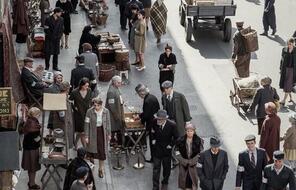Frank Blaichman’s Biography
At a Glance
Language
English — USSubject
- History
- The Holocaust
Born in the small town of Kamionka, Poland, on December 11, 1922, Frank Blaichman was 16 years old when the German army invaded the western and central parts of Poland in September 1939. The Blaichman family were among several hundred Jews living in the town. They were merchants; his grandmother owned a grocery store, and his father made a living buying grain from farmers in the area, selling it in nearby towns and in the city of Lublin. That was about to change.
Within months of the invasion, German officials issued a host of administrative decrees and regulations that were intended to isolate the Jews, deprive them of their livelihoods, and dispossess them of their property and force them to emigrate from the area, which was annexed to Germany. Jews were now required to wear armbands bearing the Star of David. They couldn’t travel outside Kamionka without special permits. They were ordered to turn over any valuables, such as gold and jewelry. Their businesses were confiscated. And they were subject to being captured at random for forced labor.
Young Frank immediately began taking daring risks in an effort to help his parents and his six brothers and sisters survive. The family needed some way to make money, so Blaichman took to the road illegally. Blaichman, who had learned Polish from customers at his grandmother’s store, rode his bicycle from neighboring farms and villages to Lubartow (six miles to the east) and Lublin (12 miles to the south) and began to buy and sell whatever goods he was able to obtain. Passing as a Pole, Frank bought honey, chickens, butter, grains, and meat from the farmers and sold these products in the cities, where he would buy tobacco, yarn, and saccharin to sell back to the farmers. The risks of traveling without papers or the required Star of David armband were enormous, but life for Jews in Nazi-occupied Poland was already precarious.
Month by month, life became harder. Jewish men were conscripted for forced labor, and Frank was assigned to work two days a week in the fields of a nearby estate where potatoes, sugar beets, and other crops were grown. Once again he took an incredible risk: he found someone he could pay to take his place in the field. By 1942, the situation was becoming dire. The community suffered from hunger and disease, was terrorized by harassment, raids, and random shootings, and heard more and more frequent rumors of mass killings and deportations to death camps. One of Frank’s uncles was shot on the spot when the Germans made a surprise search and discovered fresh meat in his house; a cousin met a similar fate when fresh bread was found in her house.
In October 1942, when the Judenrat (Jewish councils forced to carry out Nazi orders) informed the Jews of Kamionka that they were going to be “resettled” in a ghetto in Lubartow, Frank escaped and hid in a bushy area outside of town. He was determined not to be imprisoned in the ghetto, even if it meant never seeing his family again. Frank knew many friendly non-Jewish farmers in the area. One of them invited him into his home, where the family greeted Frank warmly and fed him despite the German policy to shoot any Poles who gave assistance to Jews in any way.
Frank soon learned that Kamionka’s Jews had not been relocated to the ghetto in Lubartow. The farmer told him that the Germans had put them on trains to some other, unknown destination. Frank realized that his family and many relatives, together with the rest of Kamionka’s Jewish community, were on their way to die. Like thousands of other Jews throughout Eastern Europe, Frank fled to the forest.
In the woods, he discovered an encampment of more than 100 Jews sheltered in small bunkers dug into the sandy ground and padded with straw. At first the forest seemed like a haven, but Frank soon realized the encampment was in constant danger and began to organize a defense unit. Early one morning, German soldiers, acting on information given to them by Polish spies, attacked the encampment in the forest. Over 80 Jews were murdered. Frank was one of a lucky 22 who survived. Realizing that the small forest didn’t offer enough protection, Frank’s group began to seek shelter in the more secluded villages, splitting up into smaller groups, keeping on the move, and hiding in local farmers’ homes and on their property. This turned out to be more effective than staying in the forest, especially during the harsh winter, as local farmers provided them with assistance, shelter, and cooked meals.
Early in 1943, Frank’s unit grew to 60 members when they joined forces with refugees from the town of Markuszow. That spring the unit grew again when Frank met Samuel “Mietek” Gruber, who had escaped with 28 other men from a prisoner-of-war camp in Lublin. Gruber’s group had fought in the Polish army before being captured by the Germans; they had experience fighting and knew how to handle explosives. Known as the Markuszow group under the leadership of Iser Eisenberg, they were becoming a disciplined fighting force. The expanded unit hunted spies and collaborators in the area, disrupted communication by destroying telephone lines, damaged dairy factories that produced food for the Germans, and ambushed German patrols. By September 1943, the expanded unit began working with Armia Ludowa, a communist-led Polish partisan group. Armia Ludowa provided Frank’s unit with much-needed food and ammunition from their Soviet allies. Previously armed with old rifles and handguns, the group was able to obtain explosives, hand grenades, land mines, machine guns, submachine guns, mortars, anti-tank guns, and all the ammunition they needed. Just 21, Frank was the youngest platoon commander in the expanded unit and even was selected to escort the future prime minister of Poland to a secret meeting with Soviet high command.
“I’m very proud of what I did all those years,” he says. “The reality was we had nothing to lose, and our way to survive was to fight.” 1
- 1Adapted from “Frank Blaichman: Jewish Partisan Platoon Commander" Study Guide at Jewish Partisan Educational Foundation.
How to Cite This Reading
Facing History & Ourselves, "Frank Blaichman’s Biography," last updated May 12, 2020.
This reading contains text not authored by Facing History & Ourselves. See footnotes for source information.








